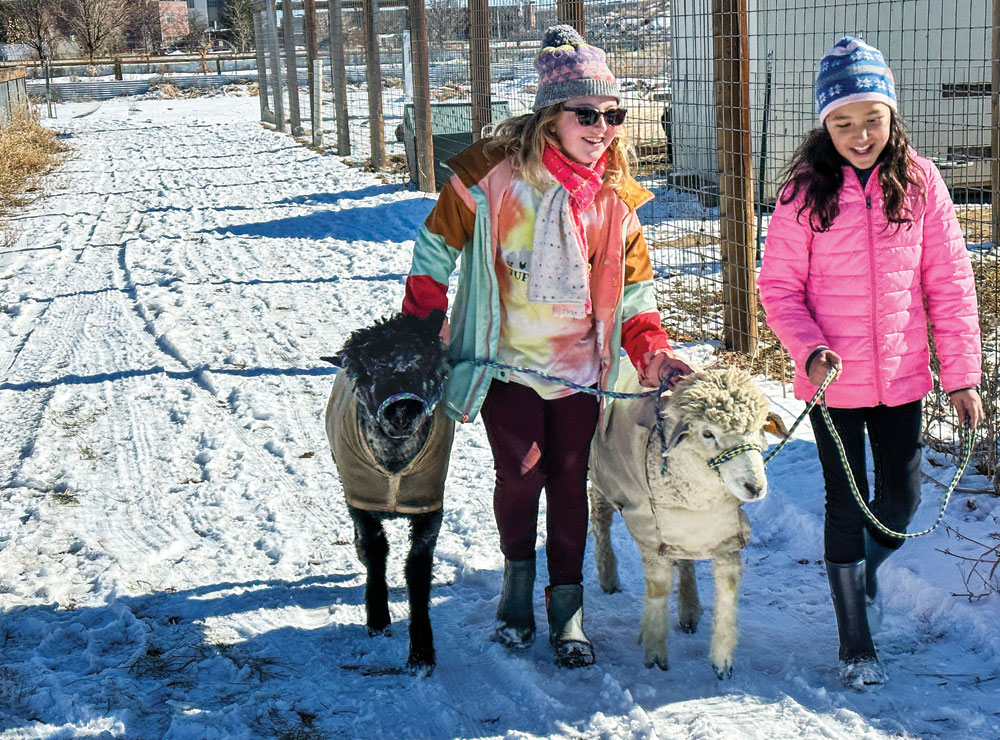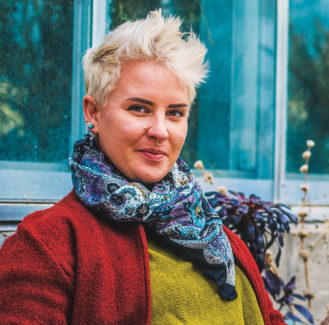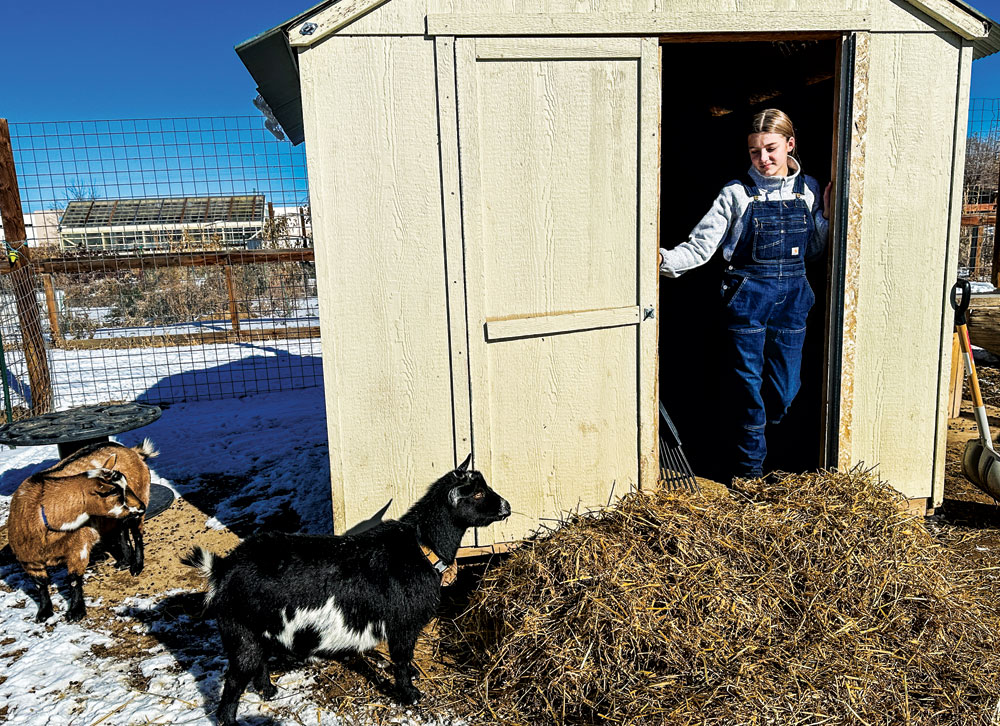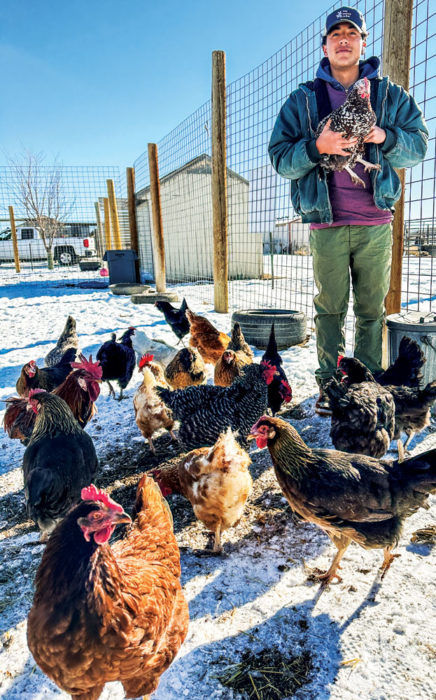
Over the past three years, The Urban Farm has expanded its summer camps, retooled its youth employment program, and revamped the livestock, poultry, and equine clubs. On a recent Saturday afternoon, two young participants helped sheep get some exercise.

Executive Director Michelle Graham has expanded programming at The Urban Farm over the past three years. Photo by Geordano Abreu
When Michelle Graham arrived as the new executive director of The Urban Farm three years ago, the organization was struggling. Fundraising was down, the main building was in desperate need of upgrading, and there were just four full-time employees. Fast-forward through the pandemic, and today the farm has 10 full-time employees, 25 seasonal or contract employees, a completely remodeled building, and grant support that has increased five-fold to $500,000 a year. The Urban Farm expanded its summer camp program this past summer from serving 125 children to 650 children, and it increased the number of after-school programs as well. “I’ve been working hard. My team has really been working hard,” Graham says with a proud smile.
The mission of the non-profit organization is to engage urban youth to promote “future generations of farmers, healthy eaters, and sustainably-minded consumers.” There are several ways the farm tries to accomplish those goals.
Livestock, Poultry and Equine Clubs
The farm is perhaps best-known for its livestock, poultry, equine programs, and 4-H clubs. The number of participants has doubled in the past three years. Nearly 150 children and teens are involved with caring for the cows, goats, sheep, horses, and chickens that live on the farm. 4-H members can lease or buy animals to show for competition. Additionally, the farm hosts an Interscholastic Equine Association team in which middle school and high school students compete across the state and beyond. The farm equine program also offers English dressage, hunter, and jumping lessons to youth of all ages. Currently there is a 200-person waitlist for those classes.

Fiona Atkinson, a member of one of the livestock clubs, cleans hay out the goat house as its residents look on.

A brand-new hydroponic system makes it possible to grow lettuce and other produce year-round.
Community Supported Agriculture
Youth can also learn about agriculture on the farm by helping in the one-acre garden and indoor hydroponic area, where they grow tomatoes, greens, peas, herbs, eggplants, summer squash, cabbage, potatoes, and much more. This past season Graham initiated a Community Supported Agriculture (CSA) program where families can buy a membership and receive a weekly box of fresh produce throughout the summer. Those memberships will go on sale in January and will cost $200-$250 for the season, with a sliding scale and free memberships for income-qualified participants. In addition, Graham held a farm-to-table fundraiser in October and hopes to hold those regularly in the coming year. The farm donates 10,000 pounds of fresh produce every year to promote food equity and access.
Juvenile Justice Partnership
The program that has seen the largest growth in the past three years is the farm’s partnership with Denver Juvenile Youth Services. The farm employs 25 teens in the summer and 10 during the rest of the year. Most of the teens have had some interaction with the criminal justice system, foster care system, or the Human Services Department. It’s part of a city program called Helping Youth Pursue Excellence (HYPE). Graham says that the catchphrase at the farm is “cultivating change in youth” and that the two things teens need most are financial opportunity and emotional support. “We give them both.” Three city employees help administer the program. In addition to growing crops, working with animals, and learning some basic construction skills, the teens also take financial literacy classes and get help with job placement.

18-year-old Lyric Perez has spent seven months working with animals, growing crops, and doing light construction at The Urban Farm.
“Will they go on to work on a farm forever? Probably not,” says Graham “But they get a lot of valuable skills and confidence. They also leave here with a resume and a bank account. We help them establish both,”
18-year-old Lyric Perez went through the HYPE program and is now an intern at the farm. He says he loves working with the animals and helping to build a greenhouse. He adds that one of the most important things that the farm offers at-risk youth is a safe space. “It definitely seems like there aren’t enough safe spaces for kids who are surrounded by gang violence. The farm provides a little escape and shows kids there are other things out there.” After his internship ends, Perez plans to train to become an electrician.
Graham says she is constantly amazed at how the farm work can change lives. “It gives them a sense of purpose and responsibility. Having a sense of purpose is so important for people… Maybe these kids weren’t successful in traditional learning environments but this is something hands-on, where you build something or grow something or care for an animal and achieve your goals.”
Despite the fundraising success, Graham says there are still many financial challenges ahead. “Animals are expensive. Our vet bills can be $60,000 a year. Ferrier bills are $45,000 a year. Hay for the animals costs $100,000 a year, and that is only going to get more expensive as droughts continue.” Still, Graham remains optimistic that the farm will continue to expand its programs and community impact in the months and years ahead. She encourages anyone who is interested in furthering the mission of the farm to buy a $100 family membership, which gives families free access to the farm, early sign-up privileges for summer camp, and discounts on camps and classes.
For more information about The Urban Farm, visit www.theurbanfarm.org.
Front Porch photos by Christie Gosch


Keep sharing!!
Thanks for the article. Lyric Lopez listed in it is Lyric Perez. Please make the correction if you can. We are very proud of him!
We are changing that online right now and apologize for the error! We will also be printing a correction in our next edition. Lyric is an impressive young man!